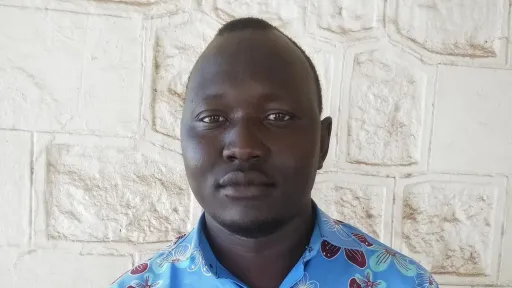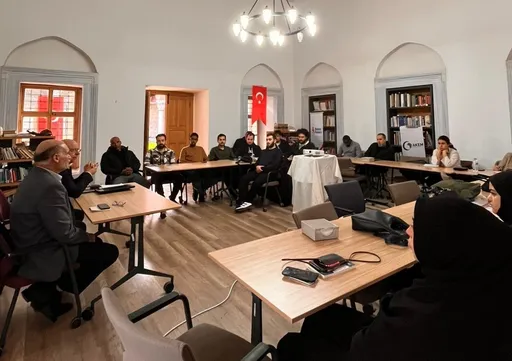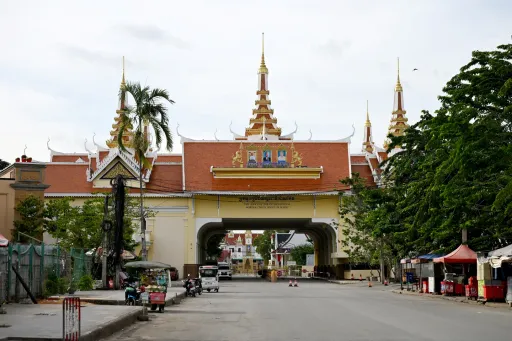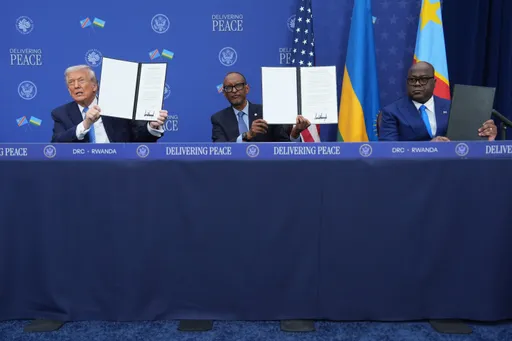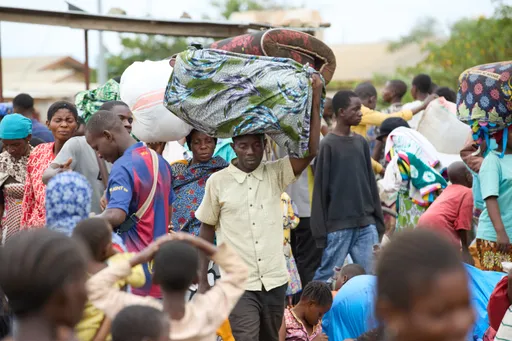By Abdulwasiu Hassan
"If you don’t know the truth about America, you will go there on false pretences."
This is the message of an Afro-American man who took the extraordinary decision of quitting his job in the US military and moving to the West African nation of The Gambia to become a farmer.
Rick Devon Usumbura, who migrated back to the continent with his family in 2016, tells TRT Afrika that he believes Africa is a better place to live in than anywhere in Europe and the US. This is in sharp contrast to the current trend of mass migration from Africa to Europe and the US, mainly by young people searching for better opportunities.
Many illegal migrants follow dangerous routes through the Sahara Desert and the Mediterranean Sea in their quest for greener pastures. According to Save the Children, about half a million people had either crossed or attempted to go across the Mediterranean to Europe since 2019.
In a report this February, the charity said 8,468 migrants had either died or gone missing while trying to cross the sea, mostly by boat. Thousands of others made it through legal routes.
The UN migration agency, IOM, has recently said January to March this year was the deadliest quarter since 2017 for migrants travelling through the Mediterranean with more than 441 deaths. It said the death toll could even be an undercount.
Rick, 59, believes the pastures are even greener in Africa than what most migrants leave the continent for. Soon after arriving in The Gambia, he bought a piece of land and set up a farm called "The Black Acres of the Gambia".
His wife Cynthia and their four children were initially against staying in the West African country, but he managed to convince them. They have all settled in nicely since and are now living happily in a country that is counted among the region's top tourist destinations.
"Guys, I have dreamt about this moment my whole life, to be able to walk on my own land, not have to jump over somebody’s fence,’’ says Rick, taking two bites of the star fruit he had just plucked from a tree in his farm.
In a video recorded by his wife and uploaded to their YouTube channel, the visibly joyful Afro-American adds that he is now able to "just eat as many fruits as I want to".
'American Dream' to nightmare
Born in the town of Dublin in the US state of Georgia, Rick was taken along by his parents as a child and settled in Chicago during the so-called Great Migration, when around six million black people moved from the rural south to the urban north of the country in the 20th century.
Later, as an adult, Rick joined the US Army. But after about 15 years in the military, he resigned as a supervisor platoon sergeant.
Rick tells TRT Afrika that he quit due to "worsening health" and his inability to continue dealing with "institutional racism". He ran a house-cleaning firm in the US before moving to Gambia in Sub Saharan Africa with his family.
Rick recalls being partly inspired by the pan-African stance of former Gambian President Yahaya Jammeh, who had urged Africans to make more efforts to be self-sufficient in food production. "The reason why we decided to move to Africa was that there is no American Dream. There is only an American Nightmare," he says.
Allegations of racism against the US security forces have been recurring in recent years, both in relation to treating black members of the military as well as civilians. The most notable instance was the killing of an unarmed black American, George Floyd, in 2020 that sparked street protests and worldwide condemnation.
In the wake of the Floyd case, chairman of the US joint chiefs of staff, General Mark Milley, told the House Armed Services Committee that there was no place for "manifestations or symbols of racism, bias or discrimination" in the US armed forces.
Rick's wife Cynthia tells TRT Afrika that many Africans desperate to migrate seem unaware of the true situation in the US. "You will just want to be there and think you are going to get what you see on television, a false pretence of what they are showing you about America."
Her husband corroborates this, saying that when migrants reach the US, they usually find "it is not all what it is cracked up to be".
The couple says their story resonates with a lot of Afro-Americans experiencing racism in the US. According to Rick, their move has influenced a number of Africans to come back to the continent from the US and Europe.
"There are a lot of Gambians who have come back as a result of us putting up the differences between Gambia and the US," Rick says. "Many of them have come back from the US, Germany, the UK and elsewhere because this is the future."
Dealing with challenges in Africa
Back in his farm, Rick says he currently considers it more of "a garden" rather than a full-fledged farm. He hopes to boost it and someday grow organic food and rear livestock at a more commercial level.
Both Cynthia and Rick acknowledge that they face challenges in Gambia. Having grown up in the US, where infrastructure is good, one of the major challenges faced by the couple has been the lack of stable electricity supply. Corruption is also a bummer.
"If we can just lessen corruption on the continent and pay decent liveable wages, that's a start," says Rick.
He believes this will greatly help in taming the tide of mass migration from Africa.
While the US generally remains far more developed than any African country, Rick is upbeat about the continent getting better. He believes the current challenges "aren't worse than dealing with things in America".
"No place is perfect," says Rick. "I would much rather have my vested stake in a place that is up and coming, as opposed to a place that is in decline. In fact. Africa is the future."









